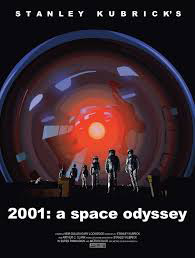 By HOWARD McQUITTER II
By HOWARD McQUITTER II
oldschoolmovies.wordpress.com
howardmcquitter68@gmail.com
This year, 2018, marks the 50th anniversary of Stanley Kubrick”'s masterpiece or, one of them anyway, “2001: A Space Odyssey” (1968), a treasure of science fiction/ drama although a film in this day that may not be fully understood, at least at the ending.
(One can honestly say, Kubrick”'s “Dr. Strangelove or: How I Learned to Stop Worrying and Love the Bomb”[1964] is also a Masterpiece.) Mr. Kubrick”'s “2001: A Space Odyssey” is a major example of his ambivalence about technology and its future for humanity. Kubrick (like myself) grew up during the” Cold War” when “The Cuban Missile Crisis” and threat of nuclear war between the United States and the Soviet Union seemed to be on the verge of breaking out. Kubrick”'s film is based on Arthur C. Clarke”'s “The Sentinel.” Both men collaborate on the screenplay to be made into four movements.
Yet, to this day the visuals are still mesmerizing with everything done mechanically (no CGI back then). Maybe Kubrick and Clarke”'s outer space adventure somehow forecast the landing on the moon the next year — 1969 — when Mission Commander Neil Armstrong and pilot Buzz Aldrin, both Americans, plant the American flag there.
The spacecraft is entirely white, surrounded by modernistic furniture and futuristic gadgets, to a large degree, will make much more sense as humanity advances in technology (although not in character or morality) in the last decades of the twentieth century and into the first quarter of the twenty-first century.
To add to the film”'s layer of refinement is setting of the sight of satellites and spacecrafts to the music of Johann Strauss”'s “The Blue Danube.” Like a songbird singing in the silence of a cerulean sky while the coldness of emotions fill the air. That is what I mean is the human characters Dr. Dave Bowman (Keir Dullea) and Dr. Frank Poole (Gary Lockwood) show little emotion as they walk about in their spaceship keeping three other scientists onboard in cryogenic hibernation making them virtual machines waiting to be switched on when required. So is it the technology which is mostly emotionless created by human “caretakers” Bowman and Poole who are emotionless that is the problem?
The most sympathetic character HAL 9000 (voiced by Douglas Rain) on board programmed by humans after all it”'s a sentient computer (or artificial general intelligence) that controls the systems of the Discovery One Spacecraft. But it is a scene when HAL confronts Dave about a human error and refuses to say it”'s a computer error. To be sure, Bowman and Poole look like the culprits in the scheme of things. HAL, I believe, wants to continue the mission. Before Frank dies HAL tries to kill him, then, Dave shuts down HAL he learns shortly HAL 9000 is the one onboard that knows the purpose of the mission. HAL has control over the mission with sinister motives to kill the crew.
The magnificence of “2001: A Space Odyssey” spawns a number of science fiction pictures: “Aliens,” James Cameron,1986; “Robocop,” Paul Verhoeven, 1987; “Terminator 2: Judgment Day,” James Cameron, 1991; “Gravity,” Alfronso Cuaron, 2013; “Interstellar,” Christopher Nolan, 2014; “Contact,” Robert Zemeckis, 1997; “The Martian,” Ridley Scott, 2015; “Blade Runner”, Ridley Scott, 1982; “Cocoon,” Ron Howard, 1985. This list is not all the science fiction movies inspired by “2001: A Space Odyssey”.
I realize Kubrick”'s “2001: A Space Odyssey” is very complicated and there is much more to write about than what I have presented.
Cast: Keir Dullea (Dr. Dave Bowman), Gary Lockwood (Dr. Frank Poole), Daniel Richter (Moon- Watcher), William Sylvester (Dr. Heywood Floyd), Leonard Rossiter (Dr. Andrei Smyslov), Douglas Rain (HAL 9000, voice), Margaret Tyzack), Robert Beatty (Dr. Ralph Halvorsen), Sean Sullivan (Dr. Bill Michaels), Bill Weston (Astronaut), Glenn Beck (Astronaut), Alan Gifford (Poole”'s Father), Ann Gillis (Poole”'s Mother). Languages: English/ Russian. Country: UK/ USA.
Running time: 149 minutes.









